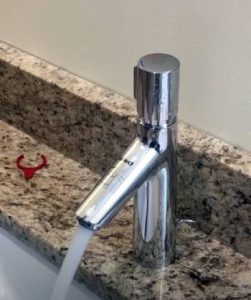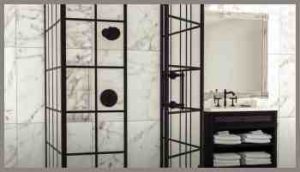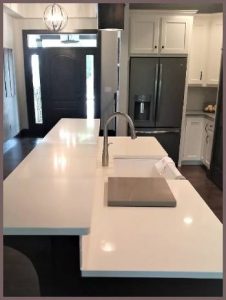In the world of interior design, vinyl floor cloths have carved a niche for themselves. With an appealing aesthetic and functional benefits, they’ve been recognized as an innovative solution for flooring.
This article delves into the pros and cons of vinyl floor cloths, providing a thorough examination from an analytical perspective.
The Pros of Vinyl Floor Cloths
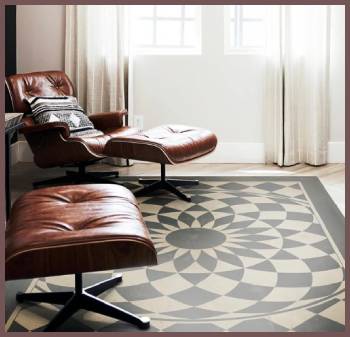
- Aesthetic Versatility
The first draw of vinyl floor cloths is their aesthetic versatility. Available in an array of designs, from vintage-inspired patterns to chic, modern graphics, there’s a vinyl floor cloth to match any decor style. They serve as a powerful design element that can change the ambiance of your space entirely.
- Easy to Install and Maintain
Ease of installation is a significant advantage of vinyl floor cloths. Unlike traditional flooring options, they don’t require professional help to install. Cleaning is straightforward, too, usually requiring nothing more than a damp mop or a gentle cleaning solution.
- Durable and Long-Lasting
If there’s a key to vinyl floor cloth’s popularity, it’s their impressive durability. These floor cloths can handle heavy foot traffic, spills, pets, and even children’s antics with ease. They’re also resistant to stains and moisture, making them suitable for kitchens, bathrooms, and mudrooms.
- Cost-Effective
Compared to other flooring options like hardwood or tile, vinyl floor cloths are more cost-effective. They provide a stylish, durable solution for a fraction of the cost, making them an excellent choice for budget-conscious homeowners.
Read More: About Cumaru Wood Flooring
The Cons of Vinyl Floor Cloths
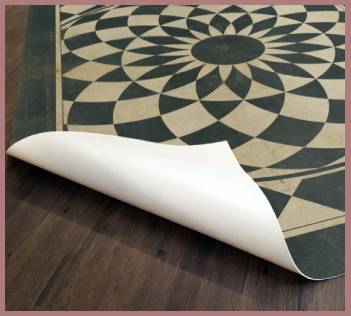
- May Require Additional Padding
While vinyl floor cloths are soft underfoot, in some cases, they may require additional padding for enhanced comfort. This means an extra expense and installation step.
- Susceptible to Fading
Over time, and with constant exposure to sunlight, vinyl floor cloths can fade. Hence, they might not be the best choice for rooms with heavy sunlight unless you have proper window treatments to limit exposure.
- Potential for Damage
Sharp objects can damage vinyl floor cloths. While they are generally durable, you’ll need to be mindful about moving furniture or dropping sharp objects to prevent scratches or tears.
FAQ about Vinyl Floor Cloths
Vinyl floor cloths are known for their durability. They can handle heavy traffic, are resistant to stains and moisture, and can last for years with proper care.
Yes, vinyl floor cloths are safe for hardwood floors. They’re non-slip and non-scratch, providing a protective layer for your hardwood. Always remember to properly clean and dry your hardwood floor before laying a vinyl cloth to prevent any potential damage.
Typically, vinyl floor cloths range in thickness from 1/16 to 1/8 of an inch. This makes them flexible and easy to install, yet sturdy enough to withstand foot traffic.
Vinyl floor cloths are made from printed vinyl with a durable protective coating, and often backed with a non-slip, grippy material.
To clean hardwood floors, it’s best to use a gentle, pH-neutral cleaner specifically designed for wood. Avoid using water or steam, as these can damage the wood over time.
Avoid using vinyl or rubber-backed rugs on hardwood floors, as they can trap moisture and damage the finish. Also, don’t use harsh cleaners or abrasive tools, which can scratch the surface.
Read More: About Naturally Aged Flooring
Competing Flooring Options: How They Compare
While vinyl floor cloths have many benefits, there are other viable flooring options to consider, each with its unique strengths and weaknesses. Here’s a brief comparison with some close competitors.
Ceramic Tiles
Ceramic tiles are a classic choice known for their beauty and durability. They are incredibly resistant to water and stains, making them an excellent option for bathrooms and kitchens. However, compared to vinyl floor cloths, tiles can be cold underfoot, require more complex installation, and tend to be more expensive.
Hardwood Floors
Hardwood floors offer a timeless aesthetic that many homeowners adore. They can last a lifetime and add value to your home. On the downside, they require more maintenance than vinyl floor cloths, can be scratched or dented, and typically come at a higher cost.
Laminate Flooring
Laminate flooring can mimic the look of hardwood or tile at a fraction of the cost. It’s resistant to scratches and easy to clean. However, it’s not as water-resistant as vinyl and can be susceptible to damage from moisture or standing water.
Once damaged, laminate flooring often needs to be replaced entirely, unlike vinyl floor cloths which can be repaired or replaced in sections.
Carpet
Carpet is warm, soft, and comes in various styles and colors. It provides a comfortable underfoot experience and sound-dampening properties. But, carpets can be a magnet for dust and allergens and can stain easily. Also, they require professional cleaning from time to time, which is not the case with vinyl floor cloths.
In the final analysis, while these competitors offer unique benefits, vinyl floor cloths strike a balance between aesthetics, durability, ease of maintenance, and cost-effectiveness. But as with any home improvement decision, it ultimately depends on your specific needs, budget, and style preferences.
Final Thoughts
In the world of interior design, trends come and go, but the focus on functional, cost-effective, and stylish solutions remains constant. Vinyl floor cloths tick these boxes, providing a unique option for homeowners seeking a stylish, durable, and budget-friendly flooring solution.
Despite a few drawbacks, with their resilience, versatility, and convenience, vinyl floor cloths have rightly earned their place in the spotlight.

